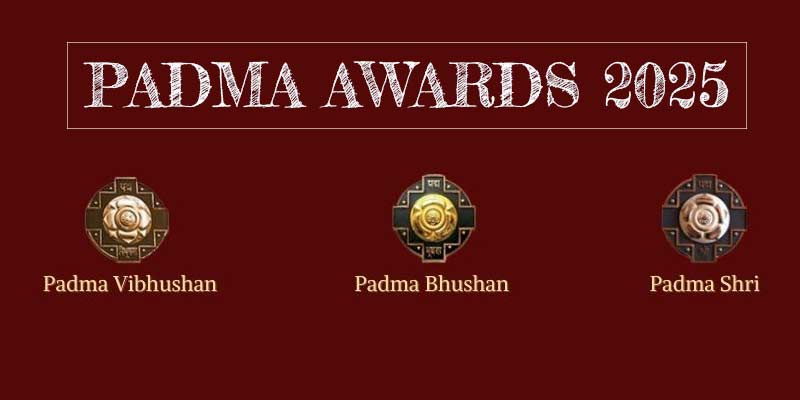- India
- Apr 29
President Murmu presents Padma awards to 71 persons
• Former chief of Suzuki Motor late Osamu Suzuki, late singer Pankaj Udhas, former Bihar deputy Chief Minister late Sushil Kumar Modi, and publisher of Tamil daily Dinamalar Lakshmipathy Ramasubbaiyer, were among the 71 prominent personalities conferred with Padma awards by President Droupadi Murmu on April 28.
• Altogether, 139 distinguished persons were named for the country’s civilian awards on the eve of the 76th Republic Day on January 25.
• As many as 71 of them were given the awards at the Rashtrapati Bhavan’s Durbar Hall on April 28 in the presence of Vice President Jagdeep Dhankhar, Prime Minister Narendra Modi, Union Home Minister Amit Shah, among others.
• The remaining will be conferred with the decorations at a separate function to be held soon.
• Veteran actor Shekhar Kapur, cricketer Ravichandran Ashwin, hockey player P.R. Sreejesh, chairman of Asian Institute of Gastroenterology and AIG Hospitals D. Nageshwar Reddy, violinist Lakshminarayana Subramaniam and Telugu superstar Nandamuri Balakrishna, also known as Balayya, were the other prominent persons conferred with the Padma awards by President Murmu.
• Among the awardees, four received Padma Vibhushan — Suzuki (Posthumous), violinist Lakshminarayana Subramaniam, chairman of Asian Institute of Gastroenterology and AIG Hospitals D. Nageshwar Reddy and Malayalam author and film director M.T. Vasudevan Nair (Posthumous).
• A total of 10 distinguished personalities were conferred with Padma Bhushan. They include Pankaj Udhas (Posthumous), Sushil Kumar Modi (Posthumous), Telugu superstar Nandamuri Balakrishna, Filmmaker Shekhar Kapur, hockey player P.R. Sreejesh, Tamil actor Ajith Kumar, chairperson of Zydus Lifesciences Pankaj Patel, and Vinod Dham, an Indian-American engineer, who is widely known as the ‘Father of the Pentium’.
• As many as 57 prominent personalities were conferred with Padma Shri.
• This year, the Padma awards were given to 30 unsung heroes, including 100-year-old Libia Lobo Sardesai, who played an important role in Goa’s freedom movement. She co-founded an underground radio station — Voice of Freedom — in a forested area in 1955 to rally people against Portuguese rule.
Padma Awards
• The Padma Awards are one of the highest civilian honours of India announced annually on the eve of Republic Day.
The awards are given in three categories:
i) Padma Vibhushan (for exceptional and distinguished service).
ii) Padma Bhushan (distinguished service of higher order).
iii) Padma Shri (distinguished service).
• The award seeks to recognise achievements in all fields of activities or disciplines where an element of public service is involved.
• The Padma Awards are conferred on the recommendations made by the Padma Awards Committee, which is constituted by the Prime Minister every year. The nomination process is open to the public. Even self-nomination can be made.
When were the awards instituted?
• The government instituted two civilian awards — Bharat Ratna and Padma Vibhushan in 1954.
• Padma Vibhushan had three classes namely Pahela Varg, Dusra Varg and Tisra Varg. These were subsequently renamed as Padma Vibhushan, Padma Bhushan and Padma Shri.
• The award seeks to recognise works of distinction and is given for distinguished and exceptional achievements / service in all fields of activities / disciplines.
The fields include:
i) Art (includes music, painting, sculpture, photography, cinema and theatre)
ii) Social Work (includes social service, charitable service and community projects)
iii) Public Affairs (includes law, public life and politics)
iv) Science & Engineering (includes space engineering, nuclear science, information technology and research & development)
v) Trade & Industry (includes banking, economic activities, management, promotion of tourism and business)
vi) Medicine (includes medical research, distinction / specialisation in Ayurveda, Homeopathy, Siddha, Allopathy and Naturopathy)
vii) Literature & Education (includes journalism, teaching, book composing, literature, poetry, promotion of education and literacy, and education reforms)
viii) Civil Service (includes distinction / excellence in administration by government servants)
ix) Sports (includes popular sports, adventure, mountaineering and yoga)
x) Others (fields not covered above and may include propagation of Indian culture, protection of human rights, wildlife protection and conservation).
• The award is normally not conferred posthumously. However, in highly deserving cases, the government could consider giving an award posthumously.
• A higher category of Padma award can be conferred on a person only where a period of at least five years has elapsed since conferment of the earlier Padma award. However, in highly deserving cases, a relaxation can be made by the Awards Committee.
• The award does not amount to a title and cannot be used as a suffix or prefix to the awardees’ name.
Manorama Yearbook app is now available on Google Play Store and iOS App Store


